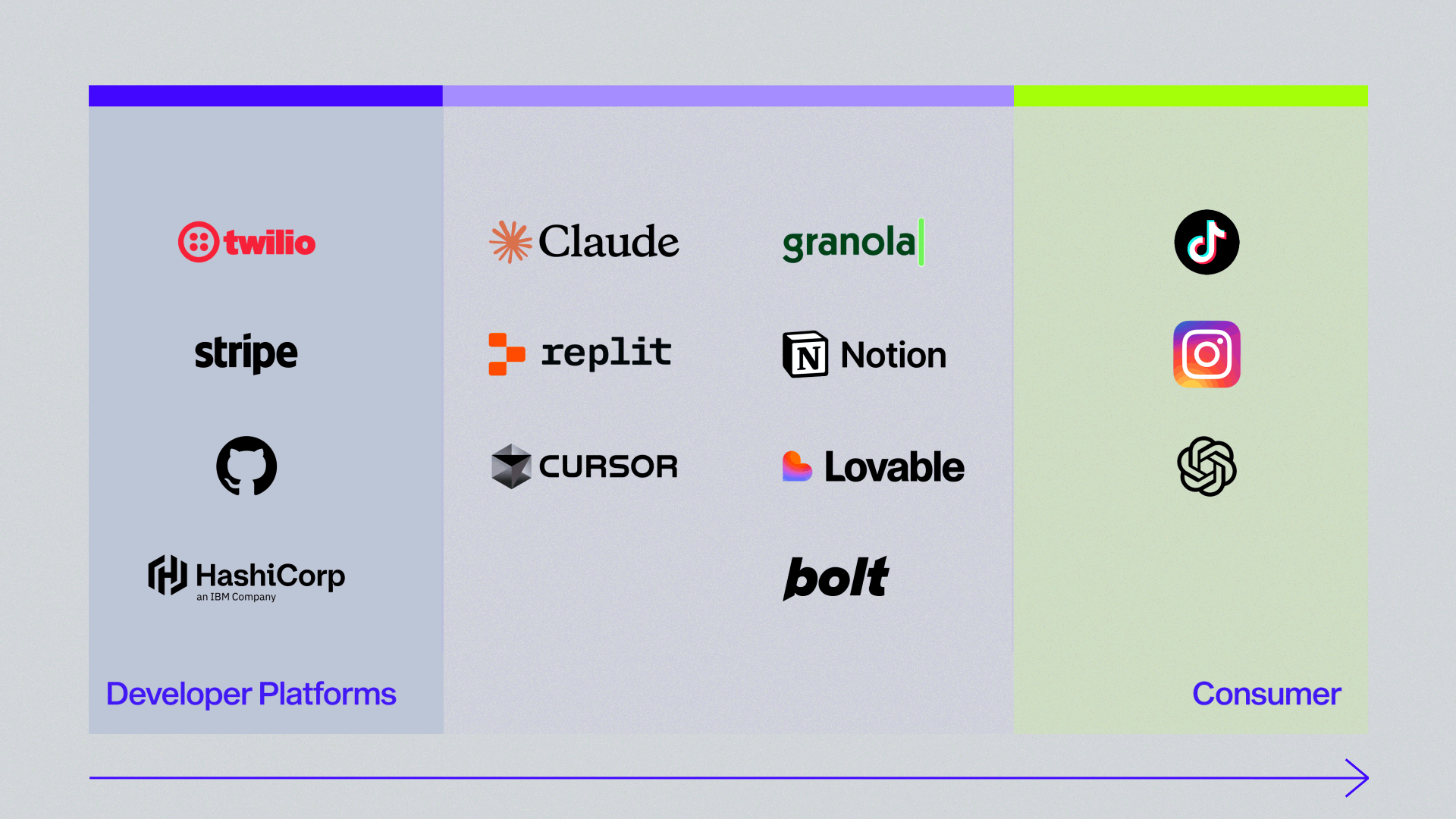Vibe Code Me a River: Developer Tools as the Next Consumer Platform

I’ve been investing in developer platforms for over 16 years. For much of that time, there was a ceiling on just how big these companies could get. The limit? Developers themselves. If your customers are developers, you need enough of them—with sufficient budget and influence—to sustain a large, durable business. In the early years, it wasn’t yet clear that the profession was influential enough to move the needle.
Then - suddenly - it was. As software ate the world, developers became a hot commodity. A gold rush ensued, fueling a boom that’s given us 17 IPOs and over a dozen unicorn-sized acquisitions plus—by ChatGPT's rough count - another 38 private companies now valued north of $1B.
Now the goalposts are moving once again.
The addressable audience for developer platforms has become orders of magnitude larger. Why? Because “developer” is no longer a job title—it’s rapidly becoming a set of capabilities every knowledge worker can wield. A new bonanza is underway - this time aimed at anyone and everyone who sits in front of a screen for a living.
This is a profound paradigm shift. Platforms like Claude, Cursor, Replit, Lovable, and Bolt are democratizing what was once the exclusive domain of software engineers. Developers are no longer the kingmakers, and building businesses that target them exclusively risks missing most of the forest.
Even more interesting: the growth dynamics of these new platforms look far more like consumer apps than classic developer tools. Think TikTok, not Salesforce. The old evangelism-heavy GTM approach is giving way to consumer-style growth marketing tactics—the same techniques that took root in the dot-com era, powered by virality, brand, and frictionless onboarding.
It’s become cliché but also objectively true to say that AI is seeping into every product. We’ve already seen it transform productivity tools (Granola, Notion), internal workflows (Lovable, Bolt), code editors (Cursor, Copilot), and of course LLMs like ChatGPT, Gemini, Claude, and Deepseek. But this is just the start. AI’s tentacles will surely reach into every aspect of work and reshape it.
In the previous wave, the best developer platforms were designed with virality baked in. Developers love to share great tools—Stripe, Twilio, GitHub, HashiCorp (the open-source tool suite) all grew thanks to being self-serve, delightful, and in return, discussion-worthy. That translated into unusually low customer acquisition costs for what were at their core B2B infrastructure businesses. Now, with AI-native, consumer-grade developer tools, the aperture is dramatically wider. The bar to adoption is lower, the user pool is exponentially bigger, and the economics look even better: higher LTVs paired with CACs that could rival social apps. This will lead to businesses that look, grow, and monetize like consumer platforms, while still commanding “corporate” budgets usually reserved for implementation-heavy products like Salesforce and ServiceNow.
I remember the early days of cloud developer platforms, and still have the bright red Twilio t-shirts/jackets - the erstwhile developer marketing tactic of choice - to prove it. That was an exciting era of rapid change characterized by arming the builders with the tools they needed to build. What’s coming next will be even more transformative. We’ll see a wave of AI-native products built for the individual first, but these tools will be far more powerful than typical prosumer tools. They will make legacy low-code/no-code look quaint - replacing drag-and-drop GUIs with natural language prompts and a conversational UI as the interface.
These tools will feel personal, intimate, and deeply customized—so much so they’ll seem to know you. They’ll be inherently collaborative and social, reducing the friction from coordinating work through today’s patchwork of chat threads and project boards.
Put it all together, and it means the next great consumer platform will be a technical one, yet radically accessible. It will harness the democratizing power of AI to bring sophisticated capabilities to everyone. ChatGPT might have been the beginning of this paradigm shift, but it’s not the end of the story - more an illustrative teaser of what’s to come. With MCP tool calling, agents will be able to act on behalf of the user beyond seeking information for you, begetting the kind of personalized AI that hasn’t really happened yet.
If history is any guide—mainframes to PCs, PCs to the Internet, Internet to smartphones—this impending paradigm shift isn’t altogether surprising. And while AI is getting aggressively priced into the startup funding market, I suspect the sheer scale of this consumerization wave isn’t yet fully appreciated by the consumers and business users who will come to rely on its progeny. For founders energized and bold enough to build for the masses, the upside will be staggering – and well worth ignoring the dauntingly low odds to achieve this kind of radical success.
The next trillion-dollar company will not look like any old consumer app; instead, it's more likely to resemble a developer platform, but of a radically different type.
Here at Chemistry, we’re excited to talk to anyone who agrees and is building this future we imagine!

.png)
